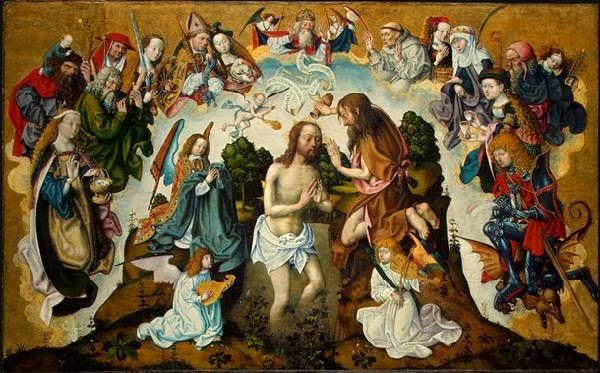St. Johnstide
Luke 3: 7-18
 |
| Tiepolo |
John said to the crowds coming out to be baptized
by him, “You are sons of the serpent yet! Who led you to believe that you can
avoid the decline of the old ways of the soul? Produce true fruits in keeping
with a change of heart and mind. And do not begin excusing yourselves by
saying, “We have Abraham as our father.” For I tell you that God can raise up
sons for Abraham out of these stones. The ax is already poised at the root of
the trees, so every tree that does not produce good fruit is felled and thrown
into the fire.”
“What should we do then?” the crowd asked.
John answered, “Let the man with two tunics share
with him who has none, and the one who has food should do the same.”
Tax collectors also came to be baptized. “Teacher,”
they asked, “what should we do?”
“Do not collect any more than you are authorized to
do,” he told them.
Then some soldiers asked him, “And what should we
do?”
He replied, “Do not intimidate and do not accuse
people falsely—be content with your pay.”
The people were waiting expectantly and were all
wondering in their hearts if John might possibly be the Christ, the Messiah.
John answered them all, “I wash you with water. But
one more powerful than I will come, the thongs of whose sandals I am not worthy
to untie. He will wash you with the breath of the Holy Spirit and with fire.
His winnowing fan is in his hand to clear his threshing floor and to gather the
wheat into his barn, while he burns up the chaff with unquenchable fire.”
And with many and various exhortations John
preached the good news to the people.
St.
Johnstide
June
24, 28, 2009
Luke
3; 7 – 18
Very young trees need to be staked until
they are strong enough to withstand heavy weather. And trees heavily laden with
fruit may need their branches propped so as not to break. But full grown and
post harvest, such external helps are no longer necessary.
The
Mosaic law, the rules of proper behavior, were necessary when humankind was
very young, to help it grow straight and strong. And it remained so when the
people were heavily laden with the rich fruits of their own development.
John
came to prepare us for the time when the fruits of the old ways would be
harvested, and the old props would no longer be necessary. For we are all
heavily laden.
Albert
Einstein said,
"Many
times a day I realize how much my own outer and inner life is built
upon
the labors of my fellow men, both living and dead, and how earnestly I must
exert myself in order to give in return as much as I have received."
 A
new law being written, a law of gratitude and love. It applies to every human
being, regardless of pedigree. It is to be a law of compassion and fairness. It
is to be a new tree, a living tree planted in the human heart.
A
new law being written, a law of gratitude and love. It applies to every human
being, regardless of pedigree. It is to be a law of compassion and fairness. It
is to be a new tree, a living tree planted in the human heart.
and
this tree, behold,
glows from within;
haloed in visible
invisible gold.[1]
glows from within;
haloed in visible
invisible gold.[1]




.jpeg)









